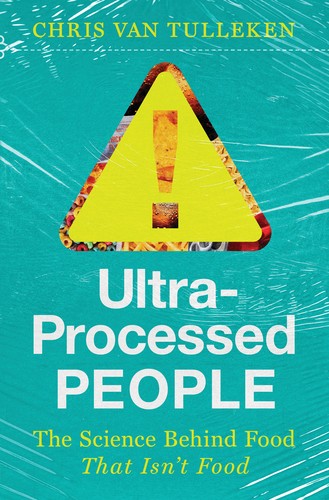Understanding Ultra-Processed People: A Strategic Insight
Chris van Tulleken’s “Ultra-Processed People” delves into the intricate dynamics of modern professional environments, where the prevalence of ultra-processed interactions and strategies mirrors the consumption of ultra-processed foods in our daily lives. This book offers a compelling exploration of how these dynamics influence business strategy, leadership, and digital transformation. Here, we synthesize the book’s core themes into actionable insights for professionals seeking to navigate and thrive in this complex landscape.
The Ultra-Processed Paradigm in Business
At the heart of van Tulleken’s argument is the concept of “ultra-processed” as a metaphor for the superficiality and complexity that often characterize modern professional environments. Just as ultra-processed foods are engineered for convenience and immediate gratification but lack nutritional value, ultra-processed business practices can be expedient but may lack depth and sustainability.
Strategic Insight: To combat the allure of ultra-processed strategies, businesses should focus on authenticity and depth. This involves cultivating genuine relationships with stakeholders and prioritizing long-term value over short-term gains. A parallel can be drawn to the slow food movement, which emphasizes quality and sustainability over speed and convenience.
Navigating Complexity with Simplicity
Van Tulleken argues that the complexity of ultra-processed environments can overwhelm decision-making processes. In business, this translates to overly complicated strategies and bureaucratic processes that stifle innovation and agility.
Strategic Insight: Embrace simplicity as a strategic advantage. By streamlining operations and focusing on core competencies, businesses can enhance agility and responsiveness. This approach is akin to the principles of lean management, which prioritize efficiency and waste reduction to drive innovation and competitiveness.
The Role of Digital Transformation
Digital transformation is a recurring theme in the book, highlighting both its potential and its pitfalls. While technology can enhance efficiency and connectivity, it can also contribute to the ultra-processed nature of business interactions, creating a veneer of engagement without genuine connection.
Strategic Insight: Leverage digital tools to enhance, not replace, human interactions. Use technology to facilitate deeper connections with customers and employees, rather than relying on it as a substitute for personal engagement. This approach aligns with the concept of digital humanism, which emphasizes the importance of maintaining human values in the digital age.
Leadership in an Ultra-Processed World
Leadership is a critical component of navigating the ultra-processed landscape. Van Tulleken emphasizes the need for leaders to model authenticity and resilience, fostering a culture that values depth and sustainability over superficial success.
Strategic Insight: Cultivate a leadership style that prioritizes empathy and authenticity. By demonstrating genuine care for employees and stakeholders, leaders can inspire trust and loyalty, fostering a more engaged and motivated workforce. This approach resonates with transformational leadership theories, which emphasize the importance of inspiring and motivating teams to achieve their full potential.
Building Resilient Organizations
Resilience is a key theme in “Ultra-Processed People,” reflecting the need for organizations to withstand and adapt to the challenges of an ultra-processed environment. This involves building a culture that values adaptability and continuous improvement.
Strategic Insight: Foster a culture of resilience by encouraging experimentation and learning from failure. By creating an environment where employees feel safe to take risks and innovate, organizations can enhance their ability to adapt to changing circumstances. This aligns with the principles of agile methodology, which prioritize flexibility and iterative development to drive continuous improvement.
Integrating Strategic Frameworks
Throughout the book, van Tulleken introduces several strategic frameworks designed to help professionals navigate the complexities of ultra-processed environments. These frameworks emphasize the importance of aligning organizational goals with broader societal values, promoting sustainability and social responsibility.
Strategic Insight: Integrate social and environmental considerations into business strategy. By aligning organizational goals with broader societal values, businesses can enhance their reputation and build stronger relationships with stakeholders. This approach is reflected in the principles of corporate social responsibility (CSR), which emphasize the importance of ethical and sustainable business practices.
Final Reflection: Embracing Authenticity and Depth
In conclusion, “Ultra-Processed People” offers a powerful critique of the superficiality and complexity that often characterize modern professional environments. By emphasizing authenticity, simplicity, and resilience, van Tulleken provides a roadmap for professionals seeking to navigate and thrive in this challenging landscape. By embracing these principles, businesses can create more meaningful and sustainable success, building organizations that are not only profitable but also socially and environmentally responsible. This synthesis of ideas calls to mind the works of Michael Pollan’s “In Defense of Food,” which advocates for a return to less processed, more natural choices, and Daniel Kahneman’s “Thinking, Fast and Slow,” which highlights the cognitive challenges of navigating complex environments. Both books, like van Tulleken’s, stress the importance of critical thought and authenticity in decision-making processes.
In the broader context of leadership and strategy, these insights reinforce the need for a holistic approach. Leaders can draw parallels from design thinking, emphasizing empathy and user-centric approaches, and from change management strategies that prioritize adaptability and stakeholder engagement. By synthesizing these diverse domains, professionals can cultivate environments that are robust, agile, and deeply aligned with their core values.

